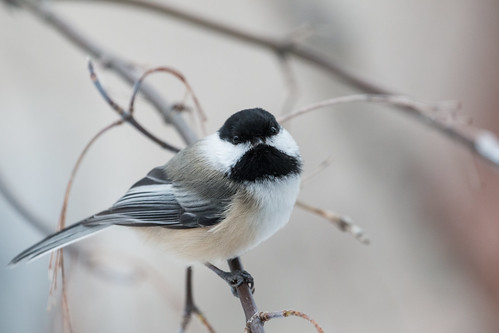 |
| What, watching me is hazardous? |
On a frigid December morning when I’m snug indoors,
sipping hot coffee at my window as I watch my backyard birds, I consider what a
safe and cozy endeavor bird watching can be. But then I read on social media
about some poor birder going off the road in the Sax-Zim bog and remember my own
experience getting stuck in a ditch on Eagle Lake Road, or I read about
someone’s optics being stolen out of their car. The late Claudia Wilds’s definitive book about birding in the Washington D.C. area is filled with
caveats to help birders avoid theft and personal attacks in urban areas. When I’ve been in
more natural habitats, I’ve found myself dangerously close to diamondback
rattlesnakes, bears, a wolf, a pack of coyotes surrounding my tent, and even a mountain lion. So I guess birding does have its hazards like just about any
other activity.
I recently paid the piper for my long years of spending so
many hours birding in the sun—a hazard that may be 93 million miles further than the furthest mountain lion on earth but nevertheless
causes skin cancer. On Christmas Eve, I had two small basal cell
carcinomas removed from my face. It was disconcerting to see comments on my
Facebook update advising me to start using sunscreen or wear hats. If you're not a physician conversing with your own patient, telling
anyone dealing with any form of cancer to change their lifestyle is cosmically
rude even beyond the presumptuousness of assuming their cancer was a justifiably
expected outcome of their behavior. In my case, I’ve always worn hats and
sunblock. My eyes as well as my skin are vulnerable to sun and I hate the color
distortion caused by sunglasses, so I hardly ever went out without a hat even
as a teenager. Indeed, my wide-brim red L.L. Bean crusher hat was sort of a
trademark for many years, from the early 1980s until people started inundating
me with questions about some “Red Hat Society” rather than birds.
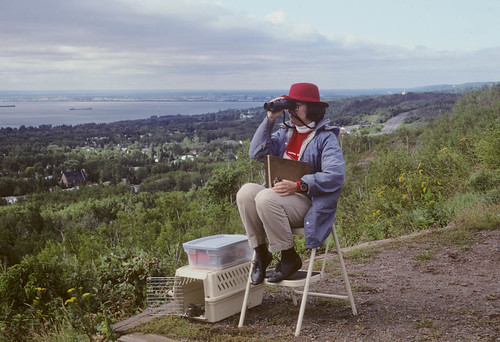 |
| Me in my red hat, in the early or mid-90s, years before anyone came up with the "Red Hat Society." |
But even
without that hat, I seldom go outdoors without some sort of head protection—a Tilley
hat or at least a newsboy or baseball cap. And I’ve been in the habit of
slathering on broad-spectrum sunblock every morning, and adding more on my nose
and chin when I go outside, for over 3 decades. My nose does get too much
exposure despite my precautions, especially since I started photographing
birds. When I pull my camera up, the tip of my nose rests against the camera
body, and my sunblock smears off onto the camera.
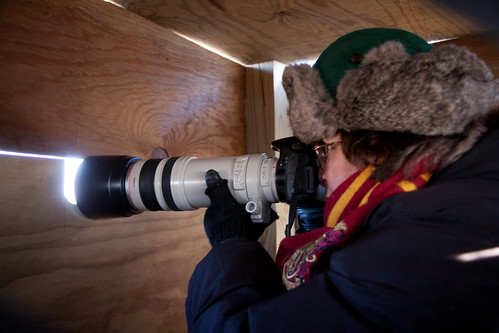 |
| See how my nose presses against the camera? |
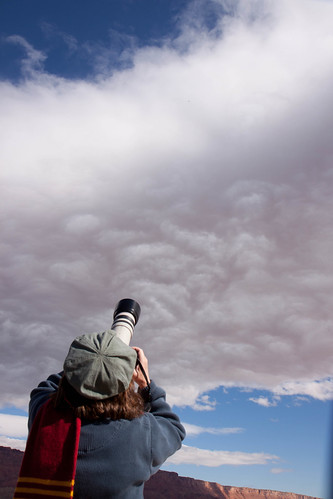 |
| Oops--photographing a California Condor is exactly the kind of thing that wipes off the sunscreen from my nose. |
I try to remember to apply
more sunscreen a few times during the day, but when the birding is good, I get
too focused to remember. But so far I haven’t had any cancer on the tip of my
nose. One carcinoma was on the side of my nose, though the sunblock seems to
stay there just fine, and the larger one was on my forehead at the hairline,
where the sun virtually never reaches—my bangs as well as my hat always keep
that area well protected. Considering how much time I’ve spent outdoors and the
fact that I’m 63, I’m lucky I didn’t get skin cancer before this—but that’s
probably because I really do use sunscreen and hats all the time.
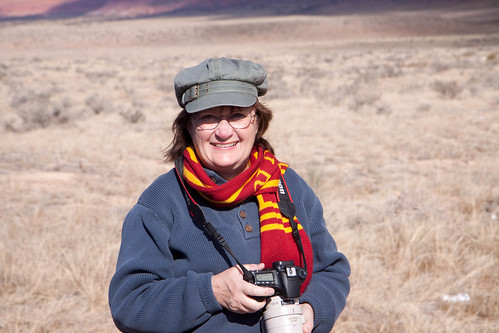 |
| It's virtually impossible to find a photo of me outdoors without a hat of some sort completely covering my upper forehead, where the larger carcinoma was. |
If you have to be diagnosed with cancer, an early basal cell
carcinoma is the best choice. Treatment usually involves only a minor
procedure, and the recovery rate is the highest of all cancers—around 99
percent when the tumor is removed via micrographic surgery in the Mohs
procedure, wherein the dermatologist progressively removes layers of skin and
examines them until only cancer-free tissue remains. Then minor plastic surgery
repairs the damage. Many birders start seeing skin cancers when they’re
significantly younger than I am, so wearing sunblock and a hat is as important
a basic birding precaution as locking your optics in your trunk and being
vigilant when alone on a trail.
I’ll have to be even more careful in the future, because
people who’ve had carcinomas are very likely to get new ones. I’m going to figure
out some way to protect my nose in particular, but overall, I’m not going to
let this affect my birding anymore than I let the chance of a car accident or
running into a bad person or a bear limit me beyond normal prudence.
Anyway, it’s
not like staying indoors watching birds out my window is without hazard. My
desk is next to my feeder window, and when I’m hard at work writing, I tend to
play music and sing along, especially when I’m totally engrossed in something. This fall, I was working on a couple of projects at my desk on the second floor of
our house, singing away, when suddenly two chickadee flocks arrived at once, so
I cranked open the window while I was in the middle of singing "Part of
Your World" from The Little Mermaid. The chickadees never seem to
mind my singing—they’ve been known to sing a song or two themselves. Anyway, while I was leaning out the window singing at high volume, with one
especially picky chickadee sitting in my hand sorting through all the mealworms, one by one, to find the biggest one, and four very impatient chickadees buzzing around my head
yelling every chickadee swear word in the book at the one in my hand (notes
which sound oh so sweet and happy to the unpracticed ear), I just happened to
look down to see an elderly couple who’d been walking their dog—they were
stopped, dead in their tracks, staring agape up at me. When I saw them, I
stopped singing, and they looked mortified (as if they were the ones singing
cartoon songs to chickadees!) and they slunk away. No, even indoors, birding has
its hazards—in that case, it did mortal damage to my sense of dignity.
 |
| Sleeping Beauty is one of my all-time favorite movies, since I saw it at the Mercury Theater when it first came out when I was 6 or 7 years old. But who would have guessed I'd have been so literal in making Briar Rose my role model?! Something like that can damage a serious conservationist's credibility as well as sense of dignity. |




